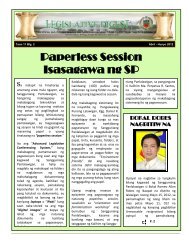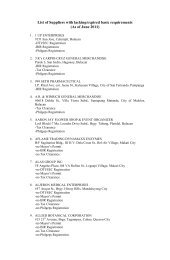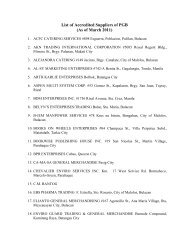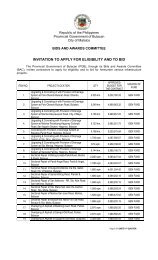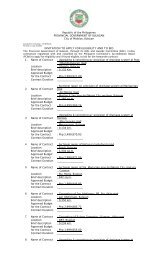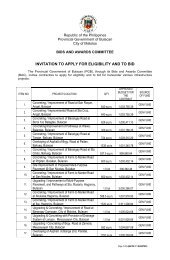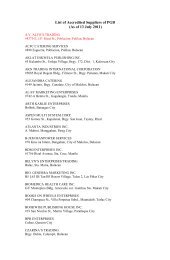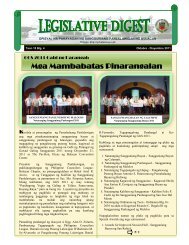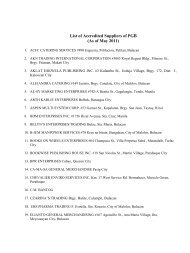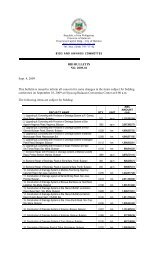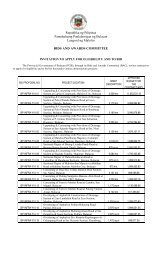- Page 1 and 2: Local Legislators
- Page 3 and 4: Local Legislators
- Page 5 and 6: TABLE OF CONTENTSForewordPrefaceAcr
- Page 7 and 8: FOREWORDThe Depart
- Page 9 and 10: government and nongovernmental reso
- Page 11 and 12: TOOL INDEXPage No.CodificationSteps
- Page 13 and 14: ABOUT THE TOOLKITWho Is the <strong
- Page 15 and 16: Part Four “Getting Citizens Invol
- Page 17 and 18: A. MEANING AND IMPORTANCE OF LOCAL
- Page 19 and 20: • the civil society organizations
- Page 21: substance of draft ordinances canno
- Page 25 and 26: C. DEVELOPMENT ISSUES FOR EFFECTIVE
- Page 27 and 28: fruits of development. This policy
- Page 29 and 30: Local legislation
- Page 31 and 32: A. UNDERSTANDING THE ROLES AND DUTI
- Page 33 and 34: Tool 1Self Analysis Checklist - Why
- Page 35 and 36: Tool 2Roles of a Local</str
- Page 37 and 38: Tool 3Template: Oath of OfficeOn th
- Page 39 and 40: Tool 6Composition of the Sanggunian
- Page 41 and 42: vi. Protect the environment. Protec
- Page 43 and 44: (4) Subject to the provisions of Bo
- Page 45 and 46: Tool 8Checklist: Powers, Duties and
- Page 47 and 48: private insurance companies, when t
- Page 49 and 50: (3) Subject to the provisions of Bo
- Page 51 and 52: ix.Regulate establishment of funera
- Page 53 and 54: xi.xii.xiii.xiv.xv.xvi.xvii.Establi
- Page 55 and 56: esources products and of endangered
- Page 57 and 58: egulations; establish fire limits o
- Page 59 and 60: impose penalties for any violation
- Page 61 and 62: appropriate ordinances over all ter
- Page 63 and 64: Tool 10Checklist: Powers, Duties an
- Page 65 and 66: (14) Prescribe fines. Prescribe fin
- Page 67 and 68: Tool 1Checklist: Powers and Duties
- Page 69 and 70: C. ADOPTING THE INTERNAL RULES OF P
- Page 71 and 72: RULE VIII - ORDER AND CALENDAR OF B
- Page 73 and 74:
Tool 2Template: Resolution Adopting
- Page 75 and 76:
D. ORGANIZING THE COMMITTEESTo get
- Page 77 and 78:
Tool 2Guide Questions for Organizin
- Page 79 and 80:
CommitteeFunctionsEnvironment andNa
- Page 81 and 82:
E. SETTING UP THE OFFICE OF THE SEC
- Page 83 and 84:
Tool 2Sample Organizational Chart o
- Page 85 and 86:
F. SETTING UP THE LEGISLATIVE-EXECU
- Page 87 and 88:
Tool 1LLEDAC Areas of Concern<stron
- Page 89 and 90:
Tool 3Sample Ordinance Creating the
- Page 91 and 92:
ENACTED UNANIMOUSLY: 25 November 20
- Page 93 and 94:
Section 5.Mayor as Co-Chairperson;
- Page 95 and 96:
RULE VI ORDER OF BUSINESSSection 18
- Page 97 and 98:
which may be funded from local reve
- Page 99 and 100:
A. FORMULATING THE LEGISLATIVE AGEN
- Page 101 and 102:
the LA team conducts its own planni
- Page 103 and 104:
Step 2. Identifying and prioritizin
- Page 105 and 106:
Step 5. Formulating goals and objec
- Page 107 and 108:
Tool 3Sample Format of Priority Leg
- Page 109 and 110:
Step 9: Mobilizing support of stake
- Page 111 and 112:
WHEREAS, the Legislative Agenda of
- Page 113 and 114:
Step 12. Managing the LAThe
- Page 115 and 116:
The following tool
- Page 117 and 118:
Tool 1Steps in Fishbone Analysis<st
- Page 119 and 120:
Tool 3Basic Research Methods<strong
- Page 121 and 122:
5. Transitional Provisions• Trans
- Page 123 and 124:
Tool 6Checklist: Requisites of a Va
- Page 125 and 126:
5. Mood• Always try to express id
- Page 127 and 128:
Tool 8A Final Checklist for Draftin
- Page 129 and 130:
The pronouns “he
- Page 131 and 132:
C. ENACTING ORDINANCES AND CODES OF
- Page 133 and 134:
Step 6. The commit
- Page 135 and 136:
Tool 2The
- Page 137 and 138:
6. First Reading and Referral of Me
- Page 139 and 140:
3. Conducting a Committee Meeting a
- Page 141 and 142:
Tool 5Template: Minutes of a Public
- Page 143 and 144:
4. Codification of Ordinances<stron
- Page 145 and 146:
Step 3. Organization and DraftingOn
- Page 147 and 148:
Tool 8Template: Resolution Creating
- Page 149 and 150:
Tool 9Template: Action Plan for Cod
- Page 151 and 152:
Tool 12Sample Code of General Ordin
- Page 153 and 154:
ecreation, relaxation, avocation, p
- Page 155 and 156:
Article.Section 2A.03. Exemptions.
- Page 157 and 158:
CHAPTER IIIHEALTH AND SANITATIONArt
- Page 159 and 160:
6. Vaccinator’s signature7. Veter
- Page 161 and 162:
CHAPTER IVTRANSPORTATIONArticle A.
- Page 163 and 164:
Section 4A.07. Time of Payment. <st
- Page 165 and 166:
Section 4A.22. Validity of MTOP and
- Page 167 and 168:
measured from the road surface and
- Page 169 and 170:
in Court against him/her. (Ord. No.
- Page 171 and 172:
Section 5B.02. Rules and Regulation
- Page 173 and 174:
licensed cockpit.c) Gaffer - refers
- Page 175 and 176:
Section 6A.02. Rules and Regulation
- Page 177 and 178:
Section 6D.02. Rules and Regulation
- Page 179 and 180:
Article B. Participation in Volunta
- Page 181 and 182:
(Sgd) HON. OSCAR P. DE JUANSB Membe
- Page 183 and 184:
Section 7. Other Codes. Other codes
- Page 185 and 186:
Green areas refer to the agricultur
- Page 187 and 188:
governor within seventy two (72) ho
- Page 189 and 190:
ii. In addition to the foregoing du
- Page 191 and 192:
acquired experience in real propert
- Page 193 and 194:
as may be prescribed by law or ordi
- Page 195 and 196:
x. Exercise such other power and pe
- Page 197 and 198:
7160;c. In addition to the foregoin
- Page 199 and 200:
of this Code, and shall have the po
- Page 201 and 202:
d. Violations. - The</stron
- Page 203 and 204:
D. For the Use of the Municipal Ass
- Page 205 and 206:
CHAPTER VIIMUNICIPAL GOVERNMENT SER
- Page 207 and 208:
· Provide plans for the proper dis
- Page 209 and 210:
ARTICLE 2PUBLIC ORDER AND SAFETYSec
- Page 211 and 212:
d. Recommend changes in the name of
- Page 213 and 214:
Section 87. Application for Marriag
- Page 215 and 216:
Barotacnons. All residual non-biode
- Page 217 and 218:
Functions of BVCSD:• MENRO• Mun
- Page 219 and 220:
The following are
- Page 221 and 222:
Section 116. Staff Development-<str
- Page 223 and 224:
CHAPTER VIIFinal ProvisionsSection
- Page 225 and 226:
TO ATTAIN THE FOREGOING POLICY1. A
- Page 227 and 228:
a. Sexual battering - this includes
- Page 229 and 230:
20. Gender sensitivity training - m
- Page 231 and 232:
Section 6. Support to Gender Studie
- Page 233 and 234:
Section 27. Women Literacy and Adul
- Page 235 and 236:
Section 45. Employment assistance P
- Page 237 and 238:
. ensure that plans & programs of t
- Page 239 and 240:
Section 66. Continuing Education ag
- Page 241 and 242:
74.7 Forcing the victim to do thing
- Page 243 and 244:
within the territorial jurisdiction
- Page 245 and 246:
compliance to the administration of
- Page 247 and 248:
CHAPTER IIIFINAL PROVISIONSSection
- Page 249 and 250:
Tool 15Sample Environment CodeRepub
- Page 251 and 252:
a causal link. This principle also
- Page 253 and 254:
. Alienation, Disposition or Conces
- Page 255 and 256:
d. Fishery. All activities relating
- Page 257 and 258:
SECTION 20. Inventory of Trees in t
- Page 259 and 260:
Municipality. The
- Page 261 and 262:
B. (1) Any person who shall cut, ga
- Page 263 and 264:
5. Convene regular meetings for pur
- Page 265 and 266:
m. Education and Public Information
- Page 267 and 268:
2. Surface water and peripheral sit
- Page 269 and 270:
j. Communication facilities shall b
- Page 271 and 272:
q. Solid waste shall refer to all d
- Page 273 and 274:
CHAPTER VIOTHER HEALTH RELATED PROV
- Page 275 and 276:
policy and water resource system an
- Page 277 and 278:
Use of water for livestock raising
- Page 279 and 280:
after due notice and hearing, in fa
- Page 281 and 282:
. Refrigeration and air-conditionin
- Page 283 and 284:
(i) Definition of Terms.1. Public i
- Page 285 and 286:
or both fine and imprisonment at th
- Page 287 and 288:
D. EVALUATING THE IMPLEMENTATION OF
- Page 289 and 290:
public attending the hearing to ask
- Page 291 and 292:
PART FOURGETTING CITIZENS INVOLVEDI
- Page 293 and 294:
B. MECHANISMS FOR LEGISLATIVE PARTI
- Page 295 and 296:
C. PUBLIC OUTREACH TOOLSThe
- Page 297 and 298:
Tool 5Letter to constituents<strong
- Page 299 and 300:
A. LEGISLATIVE PERFORMANCE INDICATO
- Page 301 and 302:
B. LOCAL LEGISLATIVE PERFORMANCE AP
- Page 303 and 304:
.1. Number of measures listed/targe
- Page 305 and 306:
c.8 Urban planning(subsume traffic,
- Page 307 and 308:
d.7 Public works(subsumewaterworks
- Page 309 and 310:
ACCOUNTABILITY AND CITIZEN PARTICIP
- Page 311 and 312:
4. Stakeholders’ Participationa.
- Page 313 and 314:
. List name of organizations furnis
- Page 315 and 316:
What do you think are your STRENGTH
- Page 317 and 318:
REFERENCESCenter for Legislative De



